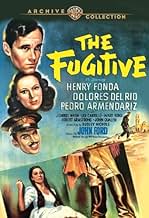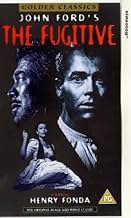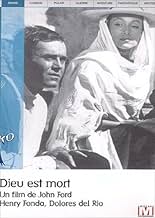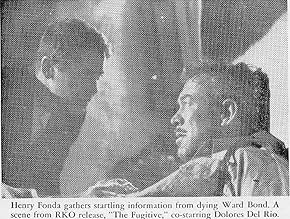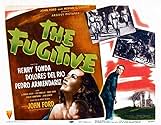AVALIAÇÃO DA IMDb
6,3/10
2,7 mil
SUA AVALIAÇÃO
Adicionar um enredo no seu idiomaAnti-Catholic and anti-cleric policies in the Mexican state of Tabasco lead the revolutionary government to persecute the state's last remaining priest.Anti-Catholic and anti-cleric policies in the Mexican state of Tabasco lead the revolutionary government to persecute the state's last remaining priest.Anti-Catholic and anti-cleric policies in the Mexican state of Tabasco lead the revolutionary government to persecute the state's last remaining priest.
- Direção
- Roteiristas
- Artistas
- Prêmios
- 1 vitória e 2 indicações no total
Dolores Del Río
- An Indian Woman
- (as Dolores Del Rio)
Pedro Armendáriz
- A Lieutenant of Police
- (as Pedro Armendariz)
Chris-Pin Martin
- An Organ-Grinder
- (as Cris-Pin Martin)
Miguel Inclán
- A Hostage
- (as Miguel Inclan)
Fernando Fernández
- A Singer
- (as Fernando Fernandez)
Rodolfo Acosta
- Policeman
- (não creditado)
Mel Ferrer
- Father Serra
- (não creditado)
Jack Pennick
- Man
- (não creditado)
José Torvay
- Mexican
- (não creditado)
- Direção
- Roteiristas
- Elenco e equipe completos
- Produção, bilheteria e muito mais no IMDbPro
Avaliações em destaque
Graham Greene is one of the literary greats, and while the book 'The Power and the Glory' that 1947's 'The Fugitive' is based on is not one of my favourites of his and one can totally see why it was controversial at the time it is an interesting read. John Ford was a truly fine director, one of the best at that time, known for some of the finest Westerns around and he excelled too in non-Westerns (i.e. 'The Quiet Man'). The cast is an interesting one, Henry Fonda being the best known.
'The Fugitive' adaptation-wise is a loose one, and the censorship the film had to endure dilutes the impact somewhat. Two of the biggest differences being Fonda's character being no longer being an alcoholic and the central relationship not being sexual, which if included would have the film quite bold. If included though, it would have made it as divisive as the book. On its own terms, 'The Fugitive' didn't wow me and the potential was there for it to have been a much better film. But it was still not bad at all, actually thought that it was quite good, and there are a fair share of note-worthy good elements.
Coming off best of the many good things is Gabriel Figueroa's outdoor photography. Which is really quite miraculous, so many of the shots leave one in wonder in their beauty and varied technical skill. Oh and the outdoor locations are just stunning. The haunting score doesn't feel too constant or in your face, having the right mood throughout while not over-emphasising too much. Ford does show frequently how great he was as a director, at its best his direction here in 'The Fugitive' is quite masterly.
Some very thoughtful and powerful moments in the script and enough of the story compels and moves. The performances are very good, with a smouldering Dolores Del Rio (though she does have moments where she overacts) and a remarkably nuanced Fonda in a complex role being generally strong. The best performance comes from a both menacing and tortured Pedro Armendariz, who is riveting whenever he appears.
On the other hand, too much of the writing is very melodramatic to an over-cooked degree, as is Del Rio at times. Some of the pace is a bit draggy.
Do agree with those that say that the religious element of the story is very heavy-handed and at times vague. It is focused on too much and it is delivered with little subtlety, the messaging was done in a way that made me feel beaten around the head.
All in all, a lot of note-worthy things but flawed. One of those "appreciated what it tried to do" sort of films while not properly loving it, the divisiveness in opinions is understandable. 6.5/10
'The Fugitive' adaptation-wise is a loose one, and the censorship the film had to endure dilutes the impact somewhat. Two of the biggest differences being Fonda's character being no longer being an alcoholic and the central relationship not being sexual, which if included would have the film quite bold. If included though, it would have made it as divisive as the book. On its own terms, 'The Fugitive' didn't wow me and the potential was there for it to have been a much better film. But it was still not bad at all, actually thought that it was quite good, and there are a fair share of note-worthy good elements.
Coming off best of the many good things is Gabriel Figueroa's outdoor photography. Which is really quite miraculous, so many of the shots leave one in wonder in their beauty and varied technical skill. Oh and the outdoor locations are just stunning. The haunting score doesn't feel too constant or in your face, having the right mood throughout while not over-emphasising too much. Ford does show frequently how great he was as a director, at its best his direction here in 'The Fugitive' is quite masterly.
Some very thoughtful and powerful moments in the script and enough of the story compels and moves. The performances are very good, with a smouldering Dolores Del Rio (though she does have moments where she overacts) and a remarkably nuanced Fonda in a complex role being generally strong. The best performance comes from a both menacing and tortured Pedro Armendariz, who is riveting whenever he appears.
On the other hand, too much of the writing is very melodramatic to an over-cooked degree, as is Del Rio at times. Some of the pace is a bit draggy.
Do agree with those that say that the religious element of the story is very heavy-handed and at times vague. It is focused on too much and it is delivered with little subtlety, the messaging was done in a way that made me feel beaten around the head.
All in all, a lot of note-worthy things but flawed. One of those "appreciated what it tried to do" sort of films while not properly loving it, the divisiveness in opinions is understandable. 6.5/10
There are essentially two ways in which to view this movie.
The first one is to compare and contrast this film with the novel from which it is loosely inspired, "The Power and the Glory" by Graham Greene. This would unfortunately lead to disappointment and a poor understanding of John Ford's motives in making this movie. While the characters and situation are indeed taken from the book, The Fugitive is radically different, not just in the manner in which the main characters are treated, but more importantly, in the message it carries. While Greene's masterpiece described how even the most outwardly depraved and despicable of human beings can be redeemed by their last actions of faith and sacrifice, John Ford was more concerned with showing how circumstances may transform a cowardly priest into a martyr for the faith. While these two themes may be related, they reveal a difference in their respective author's world view and understanding of faith and redemption. It may be argued that the code of those days would not have permitted the showing of an alcoholic and adulterous priest on screen, but this would be misunderstanding the fundamental philosophy of John Ford, whose relatively conservative views in matters of morality would have recoiled at such an idea.
This brings us to the second way in which this movie can be enjoyed and appreciated, namely as John Ford's labour of love and guilty pleasure. It has been said that, of all the masterpieces he created with Henry Fonda and others, and there were many, The Fugitive was one of his all-time personal favorites, even though it was never a popular, nor critical success. Ford projected in his version of the story many of his personal trips regarding his faith. Allegories, and barely subtle Christ references abound in this movie, though never in a simple, nor trite manner. Rather, it is a beautifully-made story of a man's journey from fear and doubt to a better understanding of his role, no matter how modest, in the grand affairs of the world.
The photography is truly a work of art, masterfully using light and shadows, brightness and dark, close-ups of faces distorted by anguish and halos of figures resembling statues in church alcoves. Fonda's performance, always perfect, reaches new heights here. His mastery at containing emotions, while letting them seep through the audience, undiluted, gives this particular characterization extraordinary strength and complexity. It would have been tempting to interpret the priest as an almost static character, given the subject matter. Instead, while his priest was neither alcoholic, nor adulterous, he displays an even greater weakness and flaw of character: lack of faith, profound self-doubt and abject cowardice. His fears, doubts and anguish and his gradual descent into debasement, are in many ways more disturbing since they are in direct conflict with the sacrifices and moral strength demanded of a priest during religious persecution.
Dolores del Rio is magnificent in her Mary-Magdalena characterization, as Pedro Amendariz, superb as the perennial Judas torn by love, hate, jealousy, and fear. There is very little dialogue, and unlike many of Ford's movie, very little of the usual comic relief which often balances dramatic moments. Yet, there is never a dull or unnecessary scene.
John Ford has crafted in this movie something better than a faithful rendition of "The Power and The Glory". Indeed, The Fugitive is a beautiful, heartfelt story about humanity's frailty and its struggle to find strength and redemption in times of crisis. In this sense it is after all a wonderful tribute to Graham Greene's novel.
The first one is to compare and contrast this film with the novel from which it is loosely inspired, "The Power and the Glory" by Graham Greene. This would unfortunately lead to disappointment and a poor understanding of John Ford's motives in making this movie. While the characters and situation are indeed taken from the book, The Fugitive is radically different, not just in the manner in which the main characters are treated, but more importantly, in the message it carries. While Greene's masterpiece described how even the most outwardly depraved and despicable of human beings can be redeemed by their last actions of faith and sacrifice, John Ford was more concerned with showing how circumstances may transform a cowardly priest into a martyr for the faith. While these two themes may be related, they reveal a difference in their respective author's world view and understanding of faith and redemption. It may be argued that the code of those days would not have permitted the showing of an alcoholic and adulterous priest on screen, but this would be misunderstanding the fundamental philosophy of John Ford, whose relatively conservative views in matters of morality would have recoiled at such an idea.
This brings us to the second way in which this movie can be enjoyed and appreciated, namely as John Ford's labour of love and guilty pleasure. It has been said that, of all the masterpieces he created with Henry Fonda and others, and there were many, The Fugitive was one of his all-time personal favorites, even though it was never a popular, nor critical success. Ford projected in his version of the story many of his personal trips regarding his faith. Allegories, and barely subtle Christ references abound in this movie, though never in a simple, nor trite manner. Rather, it is a beautifully-made story of a man's journey from fear and doubt to a better understanding of his role, no matter how modest, in the grand affairs of the world.
The photography is truly a work of art, masterfully using light and shadows, brightness and dark, close-ups of faces distorted by anguish and halos of figures resembling statues in church alcoves. Fonda's performance, always perfect, reaches new heights here. His mastery at containing emotions, while letting them seep through the audience, undiluted, gives this particular characterization extraordinary strength and complexity. It would have been tempting to interpret the priest as an almost static character, given the subject matter. Instead, while his priest was neither alcoholic, nor adulterous, he displays an even greater weakness and flaw of character: lack of faith, profound self-doubt and abject cowardice. His fears, doubts and anguish and his gradual descent into debasement, are in many ways more disturbing since they are in direct conflict with the sacrifices and moral strength demanded of a priest during religious persecution.
Dolores del Rio is magnificent in her Mary-Magdalena characterization, as Pedro Amendariz, superb as the perennial Judas torn by love, hate, jealousy, and fear. There is very little dialogue, and unlike many of Ford's movie, very little of the usual comic relief which often balances dramatic moments. Yet, there is never a dull or unnecessary scene.
John Ford has crafted in this movie something better than a faithful rendition of "The Power and The Glory". Indeed, The Fugitive is a beautiful, heartfelt story about humanity's frailty and its struggle to find strength and redemption in times of crisis. In this sense it is after all a wonderful tribute to Graham Greene's novel.
This excellent and dramatic movie , a co-production US-Mexico , is based on Graham Greene novel and written by Dudley Nichols . It starts when a priest (Henry Fonda) attempting to flee from a Centroamerican country , because Christianity being pursued by a totalitarian govern . He encounters help by an Indian woman (Dolores Del Rio) with a baby . She gives him direction to port where he could embark towards freedom . Meanwhile , he finds a mean countryman (J Carrol Naish) craving reward and is pursued by an authoritarian officer (Pedro Armendariz). Furthermore , his existence runs parallel a bank robber , The Gringo (War Bond) also relentlessly pursued .
Magnificent movie featuring awesome performances by complete casting . The film develops some John Ford's usual themes , as the sentimental nostalgia , sense of camaraderie , religion , and abound touching scenes . Henry Fonda in a larger-than-life role as a good priest is top-notch , Pedro Armendariz as a nasty general is perfect and War Bond as outlaw wanted by totalitarian police is cool . Fonda (Grapes of wrath , Drums along the Mohawk , Young Mr. Lincoln) and Pedro Armendariz (3 Godfathers , Fort Apache) played several films for John Ford . Besides , there appears Ford's habitual friends , someone uncredited , such as Jack Pennick , Rodolfo Acosta , John Qualen , Fortunio Bonanova , J Carrol Naish, Mel Ferrer's first film and the opening narration is by Ward Bond , who also plays an important role in the film . Luxurious cinematography in lights and darks by Gabriel Figueroa (usual of director Emilio Fernandez , here also producer) . Enjoyable musical score by Richard Hageman , adding Mexican songs with emotive dance included in charge of Dolores Del Rio . The picture shot in Mexico , was produced by Ford's Argosy Production Company , RKO pictures and Merian C. Cooper . Rating : Better than average , well worth seeing for John Ford enthusiasts .
Magnificent movie featuring awesome performances by complete casting . The film develops some John Ford's usual themes , as the sentimental nostalgia , sense of camaraderie , religion , and abound touching scenes . Henry Fonda in a larger-than-life role as a good priest is top-notch , Pedro Armendariz as a nasty general is perfect and War Bond as outlaw wanted by totalitarian police is cool . Fonda (Grapes of wrath , Drums along the Mohawk , Young Mr. Lincoln) and Pedro Armendariz (3 Godfathers , Fort Apache) played several films for John Ford . Besides , there appears Ford's habitual friends , someone uncredited , such as Jack Pennick , Rodolfo Acosta , John Qualen , Fortunio Bonanova , J Carrol Naish, Mel Ferrer's first film and the opening narration is by Ward Bond , who also plays an important role in the film . Luxurious cinematography in lights and darks by Gabriel Figueroa (usual of director Emilio Fernandez , here also producer) . Enjoyable musical score by Richard Hageman , adding Mexican songs with emotive dance included in charge of Dolores Del Rio . The picture shot in Mexico , was produced by Ford's Argosy Production Company , RKO pictures and Merian C. Cooper . Rating : Better than average , well worth seeing for John Ford enthusiasts .
Hmmm, let's see... we've got a movie about a Catholic priest trying to exercise his ministry in a Latin American country whose government has been taken over by an anticlerical revolutionary party,... he administers the sacraments to the devoutly believing people while trying to stay one step ahead of the law, which has hunted down every other priest in the country,... what do you this movie will be like?
In the hands of the crusty but sentimental John Ford, you might expect this movie to be some kind of hagiography, showing the priest as he performs his pastoral labors with fierce courage as well as with patient devotion, and anticipates his fate with Christian resignation. (This would be particularly apt if Pat O'Brien or Spencer Tracy played the priest.) You might also expect the people he serves will be portrayed as simple God-fearing people with stout hearts and no illusions about the true intentions of their political leaders. The government and its agents will be portrayed as cruel and cynical tyrants, ever ready to beat on the simple folk in the name of the greater good.
Fortunately, this is not the movie that Ford made. The actual movie is a good deal more complicated (and much, much better) than that. This is a balanced, intelligent account of a tragic situation born of centuries of misrule and oppression by tyrannical government working, sad to say, hand in glove with the Church that is supposed to comfort the afflicted and afflict the comfortable. Pedro Amendariz in particular gives a great performance as the revolutionary government official, who, whatever his opinions may be, passionately loves his country, and sincerely wants the best for his beleaguered people. Henry Fonda, as the priest, gives at one point a stunning assessment of his motives for what he does which turns any picture of a heroic shepherd on its ear.
This is one of John Ford's lesser known pictures - an unknown masterpiece.
In the hands of the crusty but sentimental John Ford, you might expect this movie to be some kind of hagiography, showing the priest as he performs his pastoral labors with fierce courage as well as with patient devotion, and anticipates his fate with Christian resignation. (This would be particularly apt if Pat O'Brien or Spencer Tracy played the priest.) You might also expect the people he serves will be portrayed as simple God-fearing people with stout hearts and no illusions about the true intentions of their political leaders. The government and its agents will be portrayed as cruel and cynical tyrants, ever ready to beat on the simple folk in the name of the greater good.
Fortunately, this is not the movie that Ford made. The actual movie is a good deal more complicated (and much, much better) than that. This is a balanced, intelligent account of a tragic situation born of centuries of misrule and oppression by tyrannical government working, sad to say, hand in glove with the Church that is supposed to comfort the afflicted and afflict the comfortable. Pedro Amendariz in particular gives a great performance as the revolutionary government official, who, whatever his opinions may be, passionately loves his country, and sincerely wants the best for his beleaguered people. Henry Fonda, as the priest, gives at one point a stunning assessment of his motives for what he does which turns any picture of a heroic shepherd on its ear.
This is one of John Ford's lesser known pictures - an unknown masterpiece.
When Herbert J. Yates of Republic Pictures made a deal with John Ford to produce The Quiet Man he first made Ford agree to do one of his cavalry epics with John Wayne because he wanted a surefire moneymaker before taking a chance on The Quiet Man. The cavalry picture was Rio Grande.
He must have been talking to the folks at RKO who lost their collective shirts when the public stayed away in droves from The Fugitive. It got great critical acclaim and no box office at all.
My guess is that The Fugitive was sold all wrong or was made a year or two too early. If it had been sold as an anti-Communist as opposed to a pro-Catholic film it might have done better in those beginning years of The Cold War.
The Fugitive is based on a Graham Greene novel The Power and the Glory and it is about a priest in an unnamed South American country who is a fugitive because of his calling. An anti-clerical government has taken control of the country and they are doing their best to drive the Catholic religion out of the country.
Henry Fonda turns in a good sincere performance as the cleric, but he's about as convincingly Latino as Toshiro Mifune. The other members of the cast are well suited for their roles.
The best performance in the film is from that chameleon like actor J. Carrol Naish who could play any kind of nationality on the planet. He's the informer who rats out Henry Fonda to the police. Very similar to what Akim Tamiroff did to Gary Cooper in For Whom The Bells Toll and Naish's own performance in another Gary Cooper film, Beau Geste.
This was the first of three films Pedro Armendariz did with John Ford in an effort to broaden his appeal beyond Mexican cinema. Dolores Del Rio as his estranged wife was already familiar to American audiences from the silent screen.
The original novel by Greene had the priest as somewhat less than true to all his vows. He's a drinker and a womanizer. Del Rio's character is also quite tawdry. And this from Greene who was a well known Catholic lay person. But this Hollywood in the firm grip of The Code so a lot of what Greene wrote had to be softened by Ford for the screen. It lessened the impact of the film.
And with the whitewashing of Fonda's character came some rather heavy handed symbolism of Fonda as a Christlike figure.
Still The Fugitive might be worth a look for Ford, Greene, and Fonda fans.
He must have been talking to the folks at RKO who lost their collective shirts when the public stayed away in droves from The Fugitive. It got great critical acclaim and no box office at all.
My guess is that The Fugitive was sold all wrong or was made a year or two too early. If it had been sold as an anti-Communist as opposed to a pro-Catholic film it might have done better in those beginning years of The Cold War.
The Fugitive is based on a Graham Greene novel The Power and the Glory and it is about a priest in an unnamed South American country who is a fugitive because of his calling. An anti-clerical government has taken control of the country and they are doing their best to drive the Catholic religion out of the country.
Henry Fonda turns in a good sincere performance as the cleric, but he's about as convincingly Latino as Toshiro Mifune. The other members of the cast are well suited for their roles.
The best performance in the film is from that chameleon like actor J. Carrol Naish who could play any kind of nationality on the planet. He's the informer who rats out Henry Fonda to the police. Very similar to what Akim Tamiroff did to Gary Cooper in For Whom The Bells Toll and Naish's own performance in another Gary Cooper film, Beau Geste.
This was the first of three films Pedro Armendariz did with John Ford in an effort to broaden his appeal beyond Mexican cinema. Dolores Del Rio as his estranged wife was already familiar to American audiences from the silent screen.
The original novel by Greene had the priest as somewhat less than true to all his vows. He's a drinker and a womanizer. Del Rio's character is also quite tawdry. And this from Greene who was a well known Catholic lay person. But this Hollywood in the firm grip of The Code so a lot of what Greene wrote had to be softened by Ford for the screen. It lessened the impact of the film.
And with the whitewashing of Fonda's character came some rather heavy handed symbolism of Fonda as a Christlike figure.
Still The Fugitive might be worth a look for Ford, Greene, and Fonda fans.
Você sabia?
- CuriosidadesThe opening narration is by Ward Bond, who also plays an important role in the film.
- Erros de gravaçãoWhen the Priest is on line getting ready to board a ship, he is approached by a young boy that was baptized by him. The boy informs him that his mother is dying and wishes for the priest to come home with him to give her the last rites. What is not explained is how did the boy just happen to know that the priest was in town and getting ready to board a ship at that precise moment and in the third class section.
- Citações
A Lieutenant of Police: [Looking at news clipping] You can tell he's a priest by the collar, that's all.
A Chief of Police: Not a very good picture, but it's what we got.
A Lieutenant of Police: They all look alike to me. I've shot him a dozen times.
- Trilhas sonorasBury Me Not on the Lone Prairie
("The Dying Cowboy") (uncredited)
American folk ballad based on an older sea song (1932)
Variation heard as theme for the Gringo (Ward Bond)
Principais escolhas
Faça login para avaliar e ver a lista de recomendações personalizadas
- How long is The Fugitive?Fornecido pela Alexa
Detalhes
Bilheteria
- Orçamento
- US$ 1.500.000 (estimativa)
- Tempo de duração1 hora 44 minutos
- Cor
- Proporção
- 1.37 : 1
Contribua para esta página
Sugerir uma alteração ou adicionar conteúdo ausente

Principal brecha
By what name was Domínio dos Bárbaros (1947) officially released in India in English?
Responda
